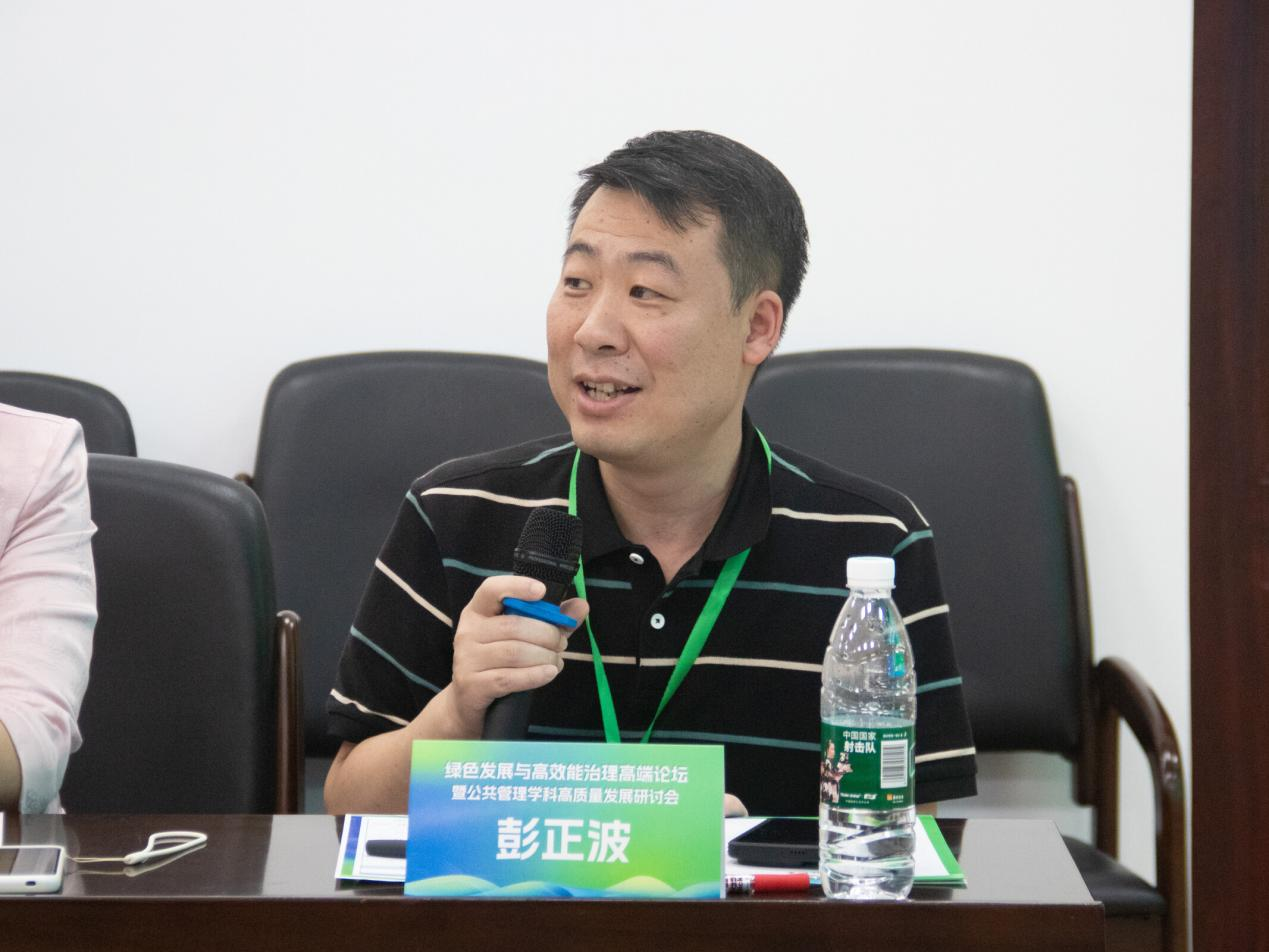On the morning of June 25, the School of Public Policy and Management hosted a symposium on the high-quality development of the public administration discipline in Academic Hall 107. The symposium brought together experts and scholars from over 30 universities nationwide to share their teaching and research achievements on this topic, exchanging experiences and insights. This event offered a high-level academic exchange for our faculty and students.
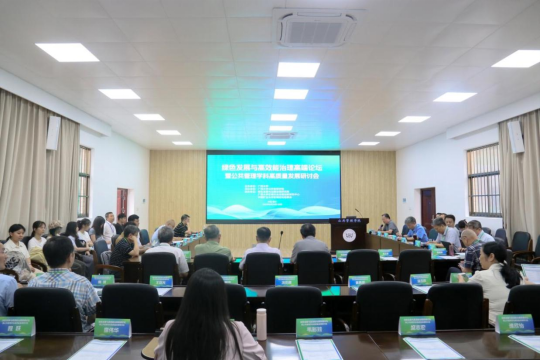
The first keynote session was chaired by Professor Ding Huang, a member and convener of the Public Policy and Management Discipline Evaluation Group of the State Council's Academic Degrees Committee, from the School of Political Science and Public Administration at Wuhan University. Professor Tong Xing, a renowned public administration scholar from the School of Government at Nanjing University, discussed the "Evolution of the Public Administration Discipline" by exploring concepts such as the "academic community," "disciplinary system," and "disciplinary research methods." Professor Zhang Kangzhi, a Changjiang Scholar from the Ministry of Education and a faculty member at the School of Public Administration at Zhejiang Gongshang University, analyzed the inadaptability of Western public administration principles in China and the challenges of creating a discourse system for public administration with Chinese characteristics. He argued that traditional Western analytical frameworks, such as state-society and public-private, do not align with Chinese public administration practices. Therefore, there is a need to construct a discourse system for public administration and social governance with Chinese characteristics.
Professor Xu Xiaolin, the founding dean of the School of Public Administration at Huazhong University of Science and Technology and the School of Public Administration and Law at Hunan Agricultural University, presented on the theme "Rethinking Public Administration," emphasizing that government is the primary focus of research in the public administration discipline and that the discipline should have clear boundaries. Professor Jin Taijun, a Changjiang Scholar from the Ministry of Education and director of the National Governance and Auditing Research Institute at Nanjing Audit University, delivered a report titled "Organic Integration of Public Administration Discipline and National Security Discipline," based on the application status of doctoral programs in these fields. Professor Du Haifeng, a member of the National Committee of the Chinese People's Political Consultative Conference and a professor at the School of Public Policy and Management at Xi'an Jiaotong University, discussed the urgent challenges faced by the public administration discipline in light of the development requirements and practices of public administration in the new era.
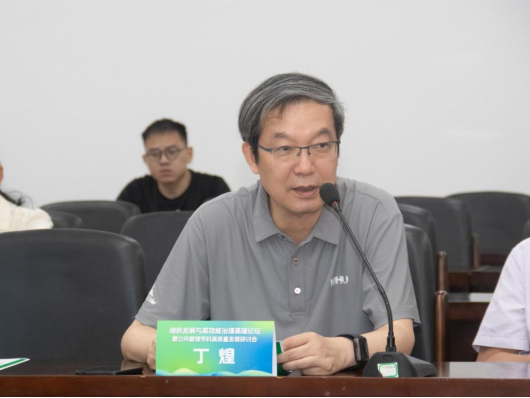
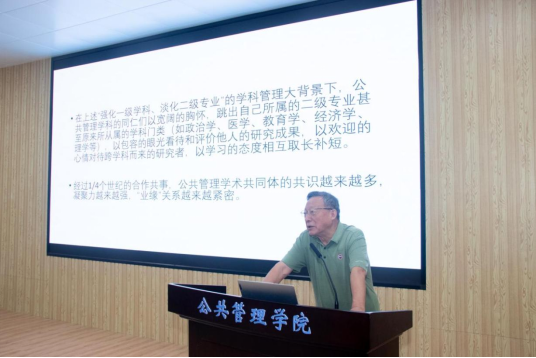
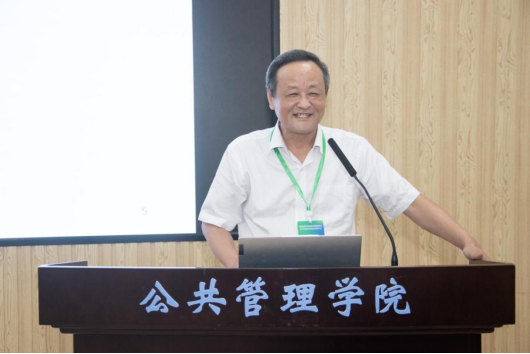



The second keynote session was chaired by Professor Zhou Zhiren, former deputy chairman of the Public Administration Teaching Steering Committee of the Ministry of Education and a professor at the School of Government at Peking University. Professor Fang Shengju, Dean of the School of Government Management at Yunnan University, spoke about "capacity education" for public administration talent, emphasizing the need to cultivate conceptual abilities centered on theory, social abilities centered on people, and professional abilities centered on work. Professor Wang Yibao, Dean of the School of Public Administration at China University of Mining and Technology, presented new thoughts on the high-quality development of the emergency management discipline under interdisciplinary integration from the perspectives of the construction background, philosophy, and goals. Professor Huang Jianhong from the School of Political Science and Public Administration at Soochow University shared insights on the era’s response and distinctive consolidation of the development of the public administration discipline, providing a detailed explanation of the discipline's connotations, scope, talent cultivation, and its response to significant changes.
Professor Shi Yungui, Dean of the School of Public Policy and Management at Guangxi University, delivered a speech titled "Exploration and Practice of a Regional Public Administration Talent Training Model Rooted in 'Green-Ethnic-Frontier' Characteristics," sharing insights from four aspects: the main teaching issues addressed by the teaching achievement, methods for solving these teaching issues, innovative points of the achievement, and the application effects of the achievement’s promotion. Professor Zhou Junxu, Deputy Dean of the School of Public Policy and Management at GXU, gave a report titled "Focusing on 'Green-Ethnic-Frontier' Characteristics to Build a Strong Public Administration Discipline Brand at West University," elaborating on our school’s discipline construction goals, supporting structures, outcome evaluation, and system improvement.

During the interactive exchange session, Professor Wang Gang, Deputy Dean of the School of International Affairs and Public Administration at Ocean University of China, and Professor Peng Zhengbo, Dean of the School of Public Administration at Guilin University of Technology, shared their insights with attending experts and scholars from the perspectives of characteristics and mainstream, positioning and talent.
Finally, Professor Ding Huang concluded the symposium on discipline construction, noting that public administration is both a young and thriving discipline. He suggested that schools with established first-level doctoral programs in public administration should engage in more reflection and summary. These schools should utilize the regional characteristics and advantageous disciplines of their institutions to perfect the secondary discipline directions within the framework of the "2+X" public administration discipline structure set by the Academic Degrees Committee of the Ministry of Education, thereby enhancing public administration’s ability to better serve the current needs of the development of the country.
